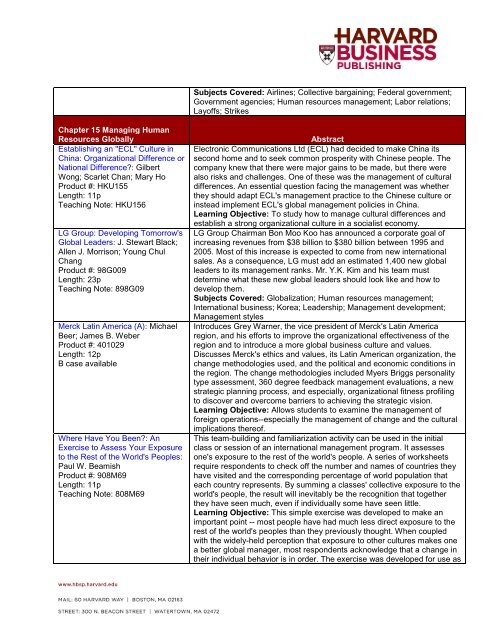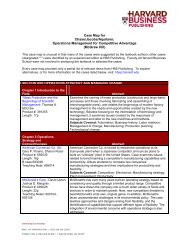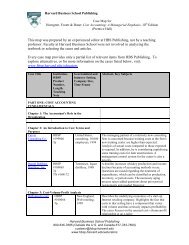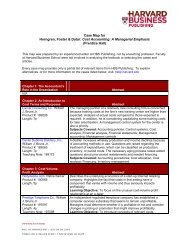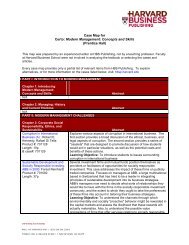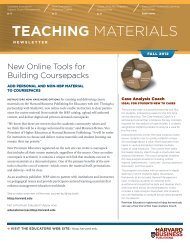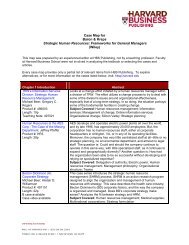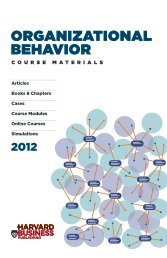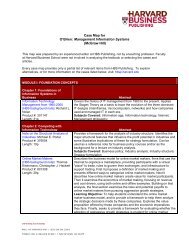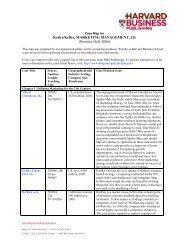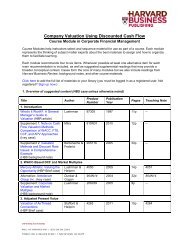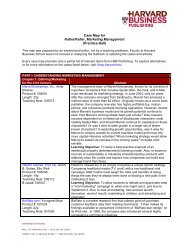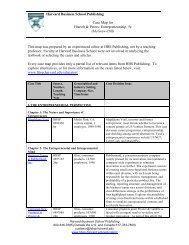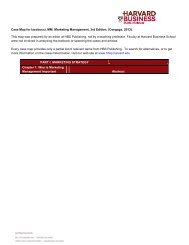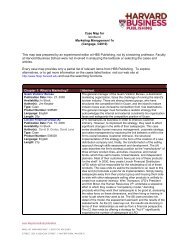Case Map for Noe, Hollenbeck, Gerhart & Wright - Harvard Business ...
Case Map for Noe, Hollenbeck, Gerhart & Wright - Harvard Business ...
Case Map for Noe, Hollenbeck, Gerhart & Wright - Harvard Business ...
Create successful ePaper yourself
Turn your PDF publications into a flip-book with our unique Google optimized e-Paper software.
Chapter 15 Managing Human<br />
Resources Globally<br />
Establishing an "ECL" Culture in<br />
China: Organizational Difference or<br />
National Difference?: Gilbert<br />
Wong; Scarlet Chan; Mary Ho<br />
Product #: HKU155<br />
Length: 11p<br />
Teaching Note: HKU156<br />
LG Group: Developing Tomorrow's<br />
Global Leaders: J. Stewart Black;<br />
Allen J. Morrison; Young Chul<br />
Chang<br />
Product #: 98G009<br />
Length: 23p<br />
Teaching Note: 898G09<br />
Merck Latin America (A): Michael<br />
Beer; James B. Weber<br />
Product #: 401029<br />
Length: 12p<br />
B case available<br />
Where Have You Been?: An<br />
Exercise to Assess Your Exposure<br />
to the Rest of the World's Peoples:<br />
Paul W. Beamish<br />
Product #: 908M69<br />
Length: 11p<br />
Teaching Note: 808M69<br />
Subjects Covered: Airlines; Collective bargaining; Federal government;<br />
Government agencies; Human resources management; Labor relations;<br />
Layoffs; Strikes<br />
Abstract<br />
Electronic Communications Ltd (ECL) had decided to make China its<br />
second home and to seek common prosperity with Chinese people. The<br />
company knew that there were major gains to be made, but there were<br />
also risks and challenges. One of these was the management of cultural<br />
differences. An essential question facing the management was whether<br />
they should adapt ECL's management practice to the Chinese culture or<br />
instead implement ECL's global management policies in China.<br />
Learning Objective: To study how to manage cultural differences and<br />
establish a strong organizational culture in a socialist economy.<br />
LG Group Chairman Bon Moo Koo has announced a corporate goal of<br />
increasing revenues from $38 billion to $380 billion between 1995 and<br />
2005. Most of this increase is expected to come from new international<br />
sales. As a consequence, LG must add an estimated 1,400 new global<br />
leaders to its management ranks. Mr. Y.K. Kim and his team must<br />
determine what these new global leaders should look like and how to<br />
develop them.<br />
Subjects Covered: Globalization; Human resources management;<br />
International business; Korea; Leadership; Management development;<br />
Management styles<br />
Introduces Grey Warner, the vice president of Merck's Latin America<br />
region, and his ef<strong>for</strong>ts to improve the organizational effectiveness of the<br />
region and to introduce a more global business culture and values.<br />
Discusses Merck's ethics and values, its Latin American organization, the<br />
change methodologies used, and the political and economic conditions in<br />
the region. The change methodologies included Myers Briggs personality<br />
type assessment, 360 degree feedback management evaluations, a new<br />
strategic planning process, and especially, organizational fitness profiling<br />
to discover and overcome barriers to achieving the strategic vision.<br />
Learning Objective: Allows students to examine the management of<br />
<strong>for</strong>eign operations--especially the management of change and the cultural<br />
implications thereof.<br />
This team-building and familiarization activity can be used in the initial<br />
class or session of an international management program. It assesses<br />
one's exposure to the rest of the world's people. A series of worksheets<br />
require respondents to check off the number and names of countries they<br />
have visited and the corresponding percentage of world population that<br />
each country represents. By summing a classes' collective exposure to the<br />
world's people, the result will inevitably be the recognition that together<br />
they have seen much, even if individually some have seen little.<br />
Learning Objective: This simple exercise was developed to make an<br />
important point -- most people have had much less direct exposure to the<br />
rest of the world's peoples than they previously thought. When coupled<br />
with the widely-held perception that exposure to other cultures makes one<br />
a better global manager, most respondents acknowledge that a change in<br />
their individual behavior is in order. The exercise was developed <strong>for</strong> use as


